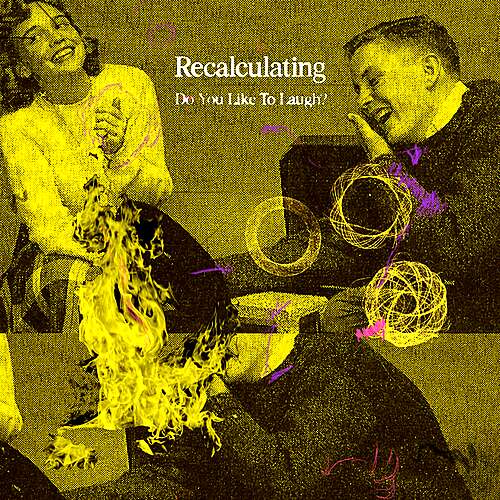|
Recalculating’s forthcoming album, Do You Like To Laugh?, is a burning missive from the depths of the pandemic. Frothing over with jagged guitars, pent-up emotionality, and intriguing cultural and literature references, the record confronts vulnerability, absurdity, isolation, and big feelings with the trio’s trademark abstractly insightful poetics.
“There is less armor and the songs aren’t as bleak—there is a healthy dose of hope—but Scott’s puckishness, my oozing id, and Michael’s from-the-gut perspective remains,” bassist/vocalist Sean Wiederkehr shares. “There is a cathartic nature to these songs. They’re visceral and some wear their heart on their sleeves, but not in obvious ways.”
The exhilarating 12-song collection of wiry post-punk and scruffy indie rock was engineered and mixed by the late alt-rock legend Steve Albini (Pixies, Nirvana, the Breeders) at his legendary Chicago studio Electrical Audio on two-inch tape. Do You Like To Laugh? will be preceded by the explosive single Candide Says.
|
|
Recalculating’s forthcoming album, Do You Like To Laugh?, is a burning missive from the depths of the pandemic. Frothing over with jagged guitars, pent-up emotionality, and intriguing cultural and literature references, the record confronts vulnerability, absurdity, isolation, and big feelings with the trio’s trademark abstractly insightful poetics.
“There is less armor and the songs aren’t as bleak—there is a healthy dose of hope—but Scott’s puckishness, my oozing id, and Michael’s from-the-gut perspective remains,” bassist/vocalist Sean Wiederkehr shares. “There is a cathartic nature to these songs. They’re visceral and some wear their heart on their sleeves, but not in obvious ways.”
The exhilarating 12-song collection of wiry post-punk and scruffy indie rock was engineered and mixed by the late alt-rock legend Steve Albini (Pixies, Nirvana, the Breeders) at his legendary Chicago studio Electrical Audio on two-inch tape. Do You Like To Laugh? will be preceded by the explosive single Candide Says.
Two-thirds of the New York City-based indie rock trio are brothers, and the other third stays late for dinner when possible. The three-piece group operates like any healthy-functioning family with all members contributing. Recalculating has managed that rare feat of having three distinct writers while maintaining a cohesive sensibility. “The thorough line is angst,” says guitarist/vocalist Scott Sendrow with a good-natured laugh. Recalculating is rounded out by drummer/vocalist Michael Sendrow, Scott’s brother.
Recalculating playfully describes its angsty and arty sensibility as “riot dad,” nodding to the 1990s riot grrrl movement. The trio has garnered favorable comparisons to Pavement, Fugazi, Wire, Talking Heads, and Mission of Burma. The band’s critically-acclaimed previous album, All Talk, came out in 2020, and received praise from tastemaker Jack Rabid's Big Takeover magazine, and radio airplay on The Sonic Blender, a college and community radio show out of Thunder Bay, Ontario. Recalculating’s latest album is a long time coming.
The cleverly-titled single, Candide Says, a punny reference to Voltaire’s masterpiece and Lou Reed’s “Candy Says,” that brims with sharp-witted cultural satire, and post-modern obtuseness. In addition to alluding to Voltaire and Lou Reed, the lyrics mention the last thirty-eight pages of 2001. It’s possible to read cultural criticism in lines like: Decline is a simple word/It sounds like roll-down gates or vacancies/And it just bores to death all the fact checkers who vet/Countless think pieces in magazines. But these lyrics could also be Pavement flights of literate lyrical whimsy. However you take it, though, the song flat-out rocks with roaring guitars, a Superchunk-like sense of scruffy urgency, and explosive loud/soft dynamics.
The evolution of Candide Says was usual for its songwriter, Scott Sendrow. Early pre-pandemic versions of “Candide Says” sounded like gentle mid-tempo acoustic sketches of someone living in “the best of all possible worlds.” However, by the time Recalculating played its first post-lockdown show, the song had been overhauled with its now signature opening guitar riff, and more conceptually-focused lyrics. “The finished piece more fully reflects the namesake’s source material, and I wasn’t above reviewing the Wikipedia page—it had been a while since I read Voltaire,” Scott reveals.
|

 Single
Single








